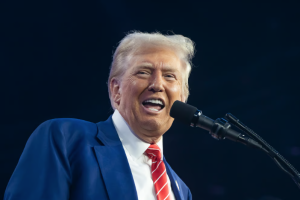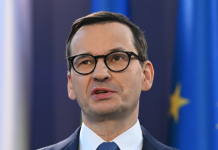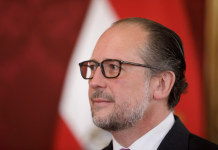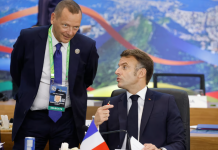No doubt our media rivals will run traditional end-of-year reviews bewailing how next year will suck more than the previous 12 months. But POLITICO is determinedly boosterish about 2025 and instead is eyeing the sunny uplands of the coming year.
As the cast of Monty Python put it (while hanging on a cross): “When you’re chewing on life’s gristle/Don’t grumble, give a whistle.”
Tomorrow, of course is unknowable: Predictions have a nasty habit of shooting wide of the mark. Soothsayers are lauded for what they get right — even if the multitude of their guesses are risibly wrong and conveniently forgotten.
There were people who insisted the internet would fail and television would just never catch on. And even the almost-foolproof U.S. election forecaster Allan Lichtman got it wrong this year with his firm prediction of Kamala Harris beating Donald Trump. And, of course, Black Swan events can upend everything, like pandemics.
Nonetheless and while acknowledging that making predictions is a fool’s game, here are five — not mutually exclusive — scenarios to cheer you up.
Stopping wars
Insurrectionist-in-chief Donald Trump may cut an odd figure as a peacemaker, but he pledged on the campaign trail that he would “stop the wars” raging around the world, including in the Middle East and Ukraine.
And he might just do so.
Certainly, Volodymyr Zelenskyy suspects that may be the case, saying Russia’s war in Ukraine will end “faster” when Trump takes over. Maybe the Ukrainian president was just putting on a brave face and trying to stay on the right side of the American leader by signaling his willingness to engage in negotiations. Saying no would likely go down badly with the former reality show host, best to let Vladimir Putin be the difficult one.
In some European quarters, there’s secret relief that Trump might bring the war to a close. And some think he’s more likely to get a better deal from Moscow than a President Kamala Harris. Despite Western promises to stick with Ukraine for as long as it takes, there’s increasing realization that the war is unwinnable if the aim is for Kyiv to recover all the territory stolen by Russia. Ukraine’s Western allies never really took into account what it would take.
If Trump brokers a deal that involves territorial losses for Ukraine, then there’s the added bonus that he can be blamed for any concessions, letting the Europeans and American hawks off the hook of the empty promises they too lightly made. Shabby maybe, but the cash-strapped Europeans don’t have the wherewithal to fund a “forever war,” and the voters aren’t going to entertain the idea of deploying troops. And at least a halt to the war will save some lives — if only temporarily as Putin is unlikely to be satisfied with a partial win for too long.

In the Middle East, Israel’s ultranationalists and Jewish supremacists have been celebrating Trump’s reelection, and his picks for his foreign policy and national security officials have only added to their good cheer. As far as they see it, Trump will give them whatever they want. Eretz Yisrael here we come. After all, his nominee to be the U.S. ambassador to Israel, Mike Huckabee, has dismissed the very idea of there being a people called Palestinians — he thinks they should be shunted off to another country.
Nonetheless, Trump didn’t give Israeli Prime Minister Benjamin Netanyahu what he wanted last time he was in the Oval Office — an endorsement of the annexation of the West Bank or at least of the Israeli settlements. And some close to the Trump inner circle doubt Bibi will be given a blank check this time either. Netanyahu has been assiduously courting Trump, trying to make up for the faux pas of congratulating Joe Biden on his 2020 election win while Trump was disputing the count and claiming the election was stolen. “Bibi could have stayed quiet,” an irritated Trump later fulminated.
If the Israeli leader expects an easy win, “I think he’s going to be disappointed, and he’s going to have to recalibrate his approach because Trump wants to end the fighting in the Middle East almost as much as he does in Ukraine,” said a Republican fixer. So here’s a prediction: The Palestinians get a sliver of the West Bank and a wrecked Gaza for their state and Ukraine loses 20 percent of its land but that’s better than nothing or more war.
Say goodbye to Pax Americana
This isn’t a difficult prediction after Trump’s reelection. The last time the great disrupter was ensconced in the White House, European leaders had faith they’d be able to weather the storm until everything reverted to the old normal. And up to a point they were right. “America is back; the transatlantic alliance is back,” Joe Biden told the Munich Security Conference a few weeks after his election — to the enormous relief of Washington’s allies, still suffering from the lingering effects of PTSD, or Post Trump Stress Disorder.
And indeed, transatlantic relations were smoother and more courteous — although there was the hiccup of Biden’s decision to allow Afghanistan to fall into the arms of the Taliban, which European officials reacted to with a mix of disbelief and a sense of betrayal. But was it such a good thing that the old normal was back? Wasn’t it always just a false dawn? Isn’t it about time Europe stands on its own two feet?
OK, Europe will have to endure again presidential histrionics and needling all-caps tweets, along with threats to withdraw from NATO and impose tariffs, but doesn’t that present an opportunity? Might now European leaders screw up their courage and loosen the apron strings? For years they’ve waffled on about strategic autonomy and sharing the burden more of their own defense. Now they have the chance to determine their own destiny.
OK, it’s all going to be a bit traumatic — growing up always is, like infants experiencing the arrival of baby teeth. But Trump back in the White House may be the thing to shake Europe out of a malaise of its own making. Admittedly it is a huge challenge because, as commentator Mujtaba Rahman, the head of Eurasia Group’s Europe practice, has noted, they will have to overcome differences on security, defense, migration and fiscal policy, which are “the least susceptible to EU-wide collective action precisely because they’re intrinsic to nation states: borders, tax and national security.”
Pooling sovereignty on these issues indeed risks fueling populism and political fragmentation, but we should remain confident — surely, it will come soon — that there will be a complete meshing of minds between Ursula von der Leyen, Hungary’s Viktor Orbán, Italy’s Giorgia Meloni, Slovakia’s Robert Fico, France’s Emmanuel Macron et al.
Adaptation, not mitigation
Let’s face it, net zero was never going to work. Next year, more nations will embrace the idea that it’s far better instead to spend your energy reducing vulnerability to extreme weather and climate change impacts. Build better, eat meat and double down on your fast fashion retail therapy, in other words.
COP 29, if nothing else, was a massive success in terms of introducing a long-needed healthy dose of realism. And we have Azerbaijan’s autocrat Ilham Aliyev to thank for the cratering of the conference. Climate mitigation goals are never met and why on earth should one buy an EV and run the risk of being a couple of hundred miles away from a charging station! Aliyev is right — fossil fuels are a gift from God. OK, some low-lying islands will be swamped — but no one can find them on the map even now anyway.
Trump, Musk and MAD
Still unconvinced next year will be better than 2024? The Mutually Assured Disruption that’s inevitable between top dog Trump and his current pal-in-chief Elon Musk should be a grand spectacle. Two cooks in a kitchen — especially larger-than-life ones like Gordon Ramsay and Marco Pierre White — never works well. Two presidents in the Oval Office will be even more delicious.
Musk will argue his $200 million election contribution buys him something more than just the newfangled, so-called Department of Government Efficiency. The “department” has apparently been named after Musk’s favorite meme and cryptocurrency. But it’s easy to imagine that Musk also had in mind the office of the Venetian Doge, the chief magistrate of what eventually became known as the Most Serene Republic of Venice. Admittedly a fair sprinkling of doges ended up deposed, blinded and exiled. But the process toward that end should be fun.
There’s already friction between Musk and Trump’s advisers with reports of a massive blowup between the Tesla billionaire and Boris Epshteyn — a lawyer who coordinated the legal defense for Trump’s criminal cases. Epshteyn has been overseeing Cabinet picks, and during a dinner at Trump’s Mar-a-Lago club, the two clashed loudly, with Musk casting doubts on some of the picks and accusing the longtime Trump adviser of leaking to the press.
Musk then took to X, the social network he owns, to publicly pressure Trump on economic policy and on Cabinet picks, praising a foreign leader for cutting tariffs, quite the opposite of what Trump is planning, and advancing who he thought should be the Treasury secretary. Trump loyalists reckon the bromance can’t last between the headstrong men, arguing there will come a time when Musk oversteps the mark by failing to realize he isn’t actually a Venetian Doge. When the eruption finally happens, via the rival social networks the great men control — at the very least it will be louder and more fiery than an Independence Day celebration on the Mall.
Brave new world of AI
Speaking of Musk — no, this isn’t a suggestion he’s an artificial intelligence — the fast-approaching era of AI is upon us.
The doomsters fret about how AI will be even more handy for authoritarians to manipulate and disinform with deepfakes. Other gloomsters worry democracies will lose out in the race to be the victors on AI and other emerging technologies, which have “become crucial to the global competition between the free world and our malign authoritarian rivals,” according to General Nick Carter, former U.K. chief of defense staff and Robyn Scott, CEO and co-founder of Apolitical. “And it is the victors of this competition who will be able to determine our future,” they say.
Henry Kissinger and others feared that AI will elevate the power of non-state actors and corporations like those controlled by Musk and Amazon’s Jeff Bezos or throw “the age-old balance of power for a new, uncharted disequilibrium.”
If some states adopted AI at the highest level more readily than others, the world would be even less predictable. “In cases where some humans might face off militarily or diplomatically against a highly AI-enabled state, or against AI itself, humans could struggle to survive, much less compete,” Kissinger wrote recently with Eric Schmidt, former Google CEO and Craig Mundie, former senior Microsoft adviser.
Grim stuff. But it’s better to remain upbeat about AI and embrace the scenario Kissinger posits of corporations forming alliances to consolidate their already considerable might. “These corporate alliances might take on traditional nation-state functions, though rather than seeking to define and expand bounded territories, they would cultivate diffuse digital networks as their domains.”
Musk, of course, has already implanted in two patients a Neuralink brain-computer interface, which is designed to let them control a computer or mobile device anywhere they go. There have been teething problems and malfunctions, apparently. But we can look forward to the day — it can’t come soon enough and hopefully next year — when we don’t have to shout at Jeff Bezos’ Alexa and instead just think: It’s time to turn the lights out.






















